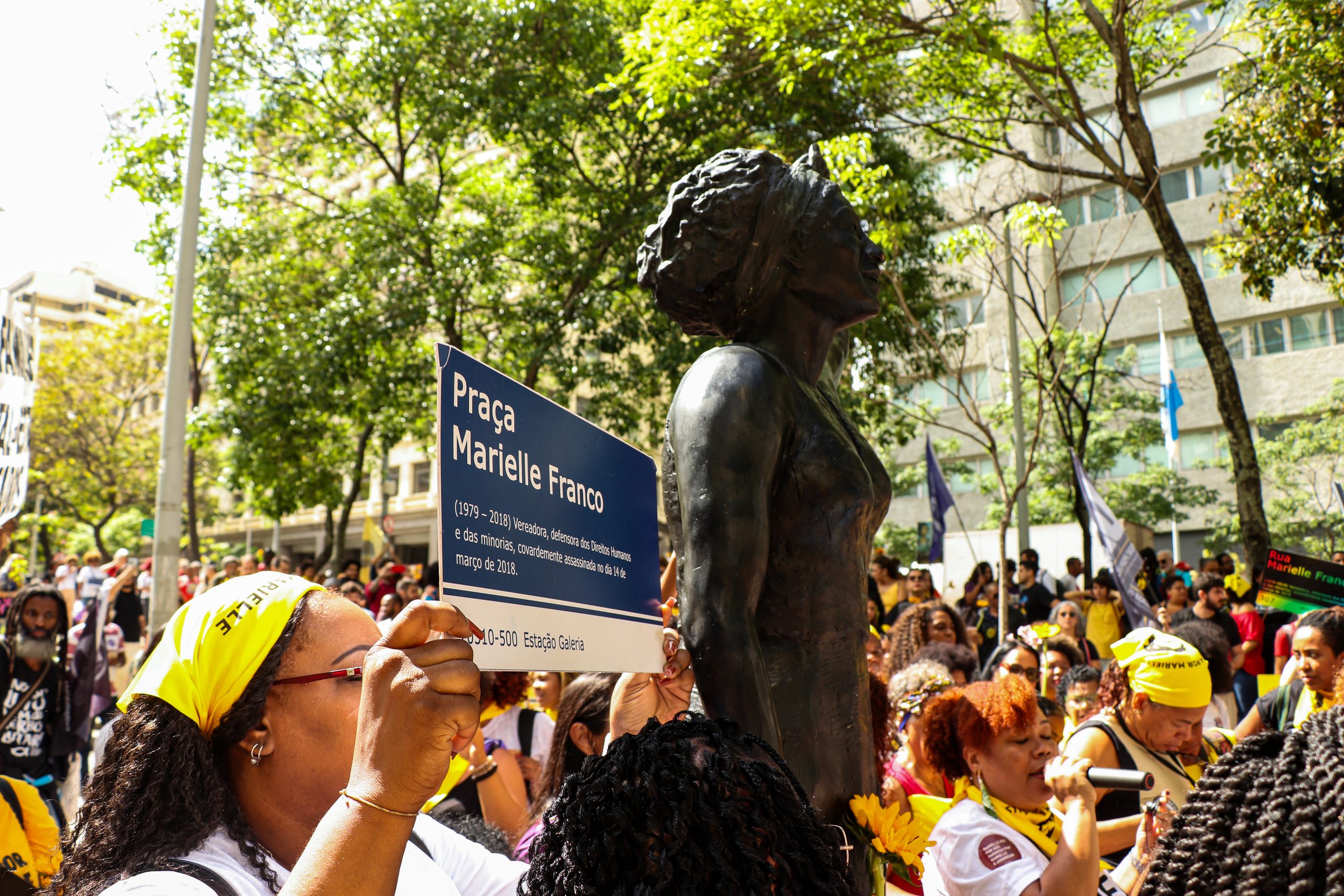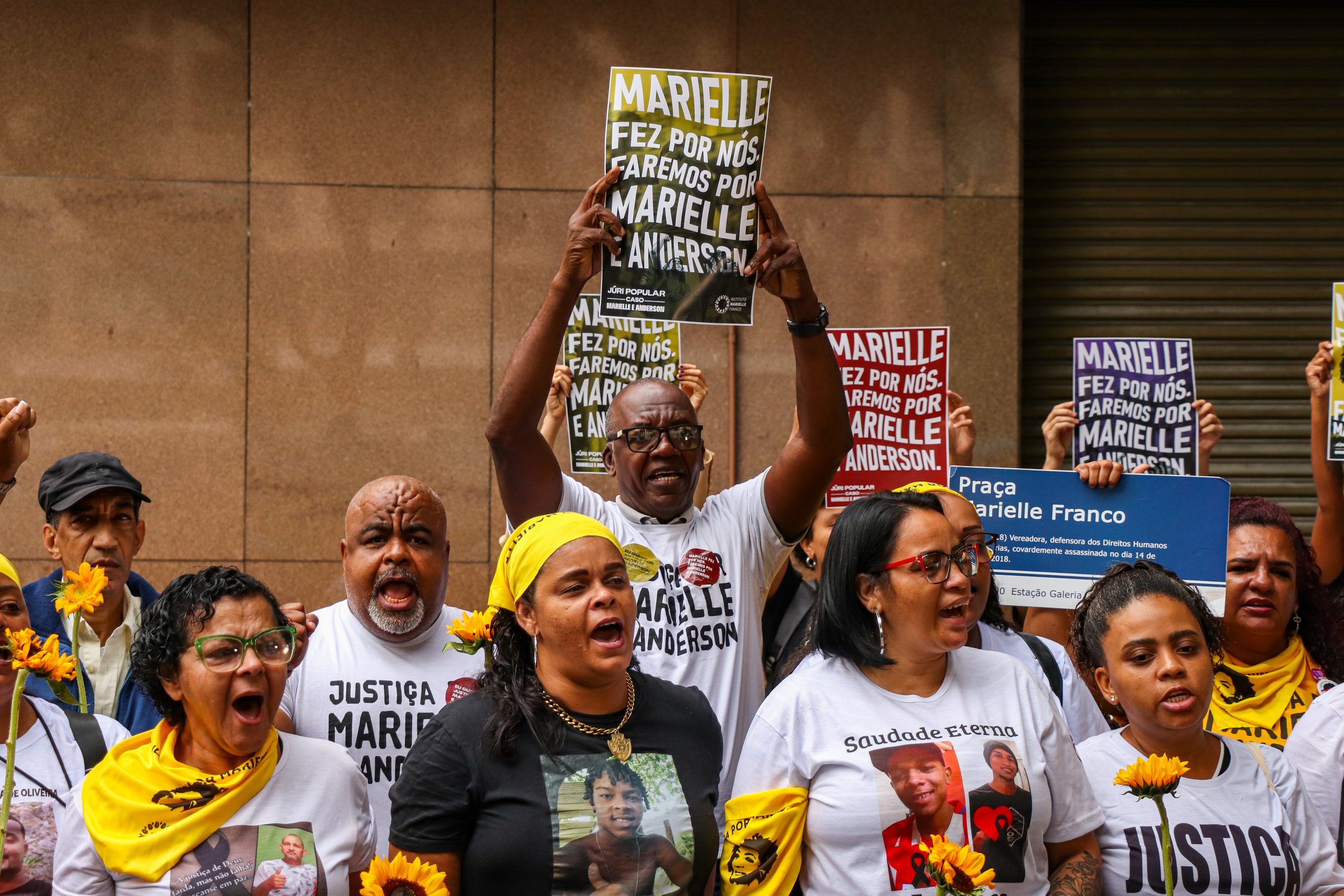
Clique aqui para Português
On October 30 and 31, after over six years of waiting, the trial of the killers of councilwoman and human rights defender Marielle Franco and her driver Anderson Gomes finally took place. The two were ambushed and killed on March 14, 2018, in Estácio, in central Rio de Janeiro.
At 7am on October 30, family members, friends, and activists gathered in front of the Rio de Janeiro Court of Justice (TJ-RJ) for the “Dawn for Marielle and Anderson” rally, demanding justice. Organized by the Marielle Franco Institute, the Justice for Marielle and Anderson Committee, Amnesty Brazil, Global Justice, and Land of Rights, the rally called for accountability from the assassins and reparations for both the families and society.
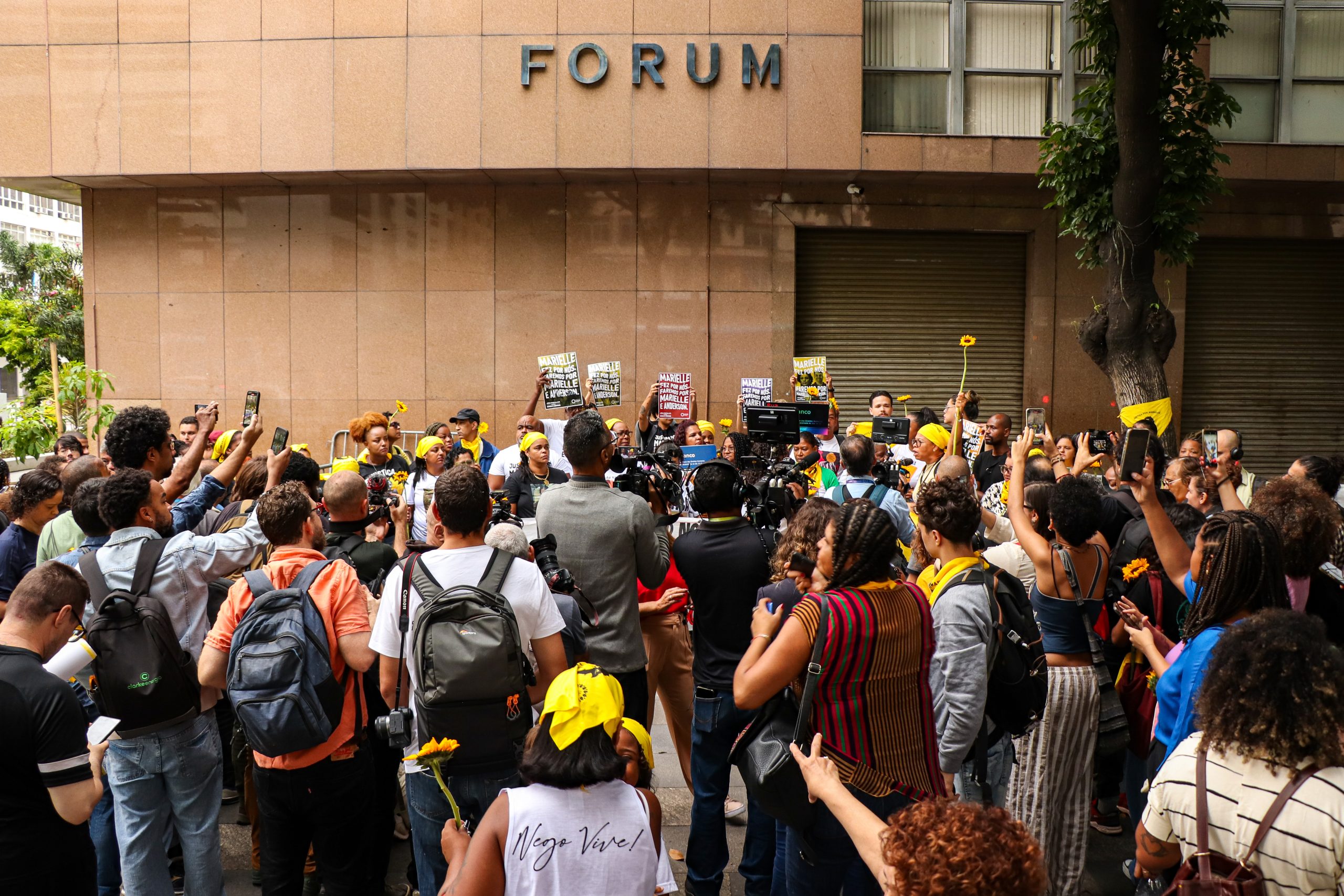
The first morning’s events were coordinated by Flavia Candido, a mother, teacher, and resident of Complexo da Maré. A former advisor to Marielle and now a parliamentary advisor to State Deputy Renata Souza, she also coordinates the Maré 0800 Collective and is a dedicated human rights defender. Candido delivered powerful remarks about the struggle sparked by Marielle and so many other Black women.
“We’ve been holding Dawn for Marielle and Anderson rallies throughout Brazil since October 10, calling for justice. Today is a day when the State can respond to Marielle and Anderson’s families, as well as to all the mothers of victims of the State—something that has been denied to them many times this year… For this reason, the cry for justice for Marielle and Anderson is a cry that echoes in response to the families of victims present here today. Marielle has become a symbol of the seeds that are thriving today—strong, vigorous: Black women who have been elected, Black women fighting many other battles, and Black men who, inspired by Marielle, are sowing these seeds both inside and outside of parliaments, seeking more inclusive public policies and always advocating for justice. When Mari entered that House (City Council), which was not built for bodies like ours, she said something deeply meaningful: ‘Before me came Jurema Baptista, and before her came Benedita da Silva.’ Since Mari’s execution, we managed to place three Black women in that House. However, it is not just about occupying that space; it is about understanding that these bodies are not disposable. It is about understanding that abolition must truly happen. These bodies here are not targets, and that is what the State needs to grasp. Marielle’s execution is the responsibility of the State. Marielle was the rapporteur for the federal intervention in Rio de Janeiro, and it is crucial that this be understood.” — Flavia Candido
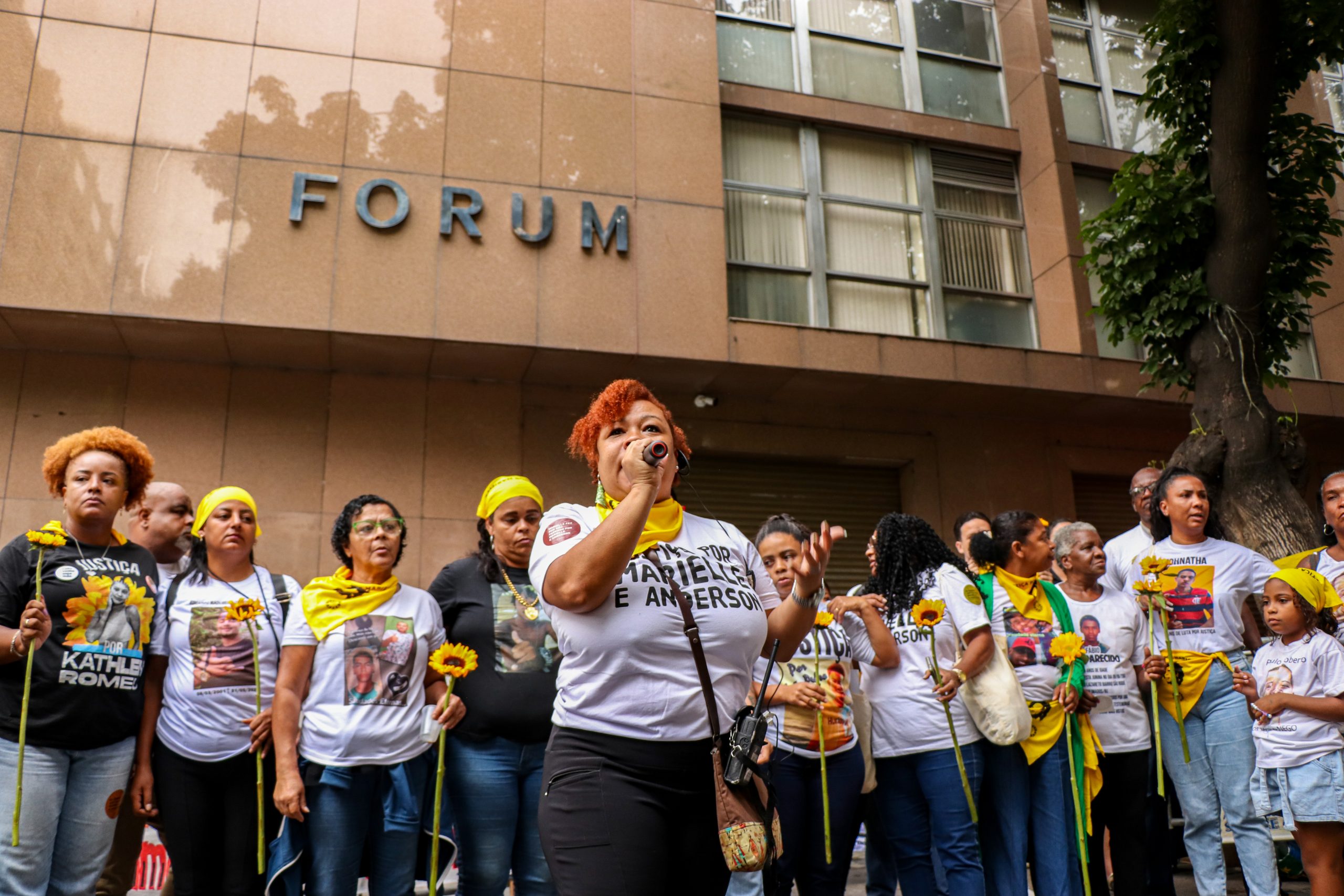
A sociologist and councilwoman, Marielle was elected in her first electoral campaign in 2016 with 46,502 votes—the fifth most-voted candidate in Rio de Janeiro that year. She stood out as a Black woman born and raised in favelas, LGBTQIAPN+, and a human rights defender. From the favelas of Complexo da Maré, she served for nearly ten years as advisor to State Deputy Marcelo Freixo, leading the Rio de Janeiro Legislative Assembly’s (ALERJ) Human Rights Commission prior to her election to City Council. Once elected, in 2018, Marielle became rapporteur on the federal intervention of Rio. Her work focused on defending the rights of Black women and favela residents, fighting police violence and militias, and advocating for favela residents’ land rights.
The family’s arrival at the Court of Justice was marked by demonstrations of support, care, and solidarity as they were welcomed with sunflowers. This flower became the symbol of Marielle’s 2016 campaign. Afterward, the family held a press conference where they shared their expectations for the trial.
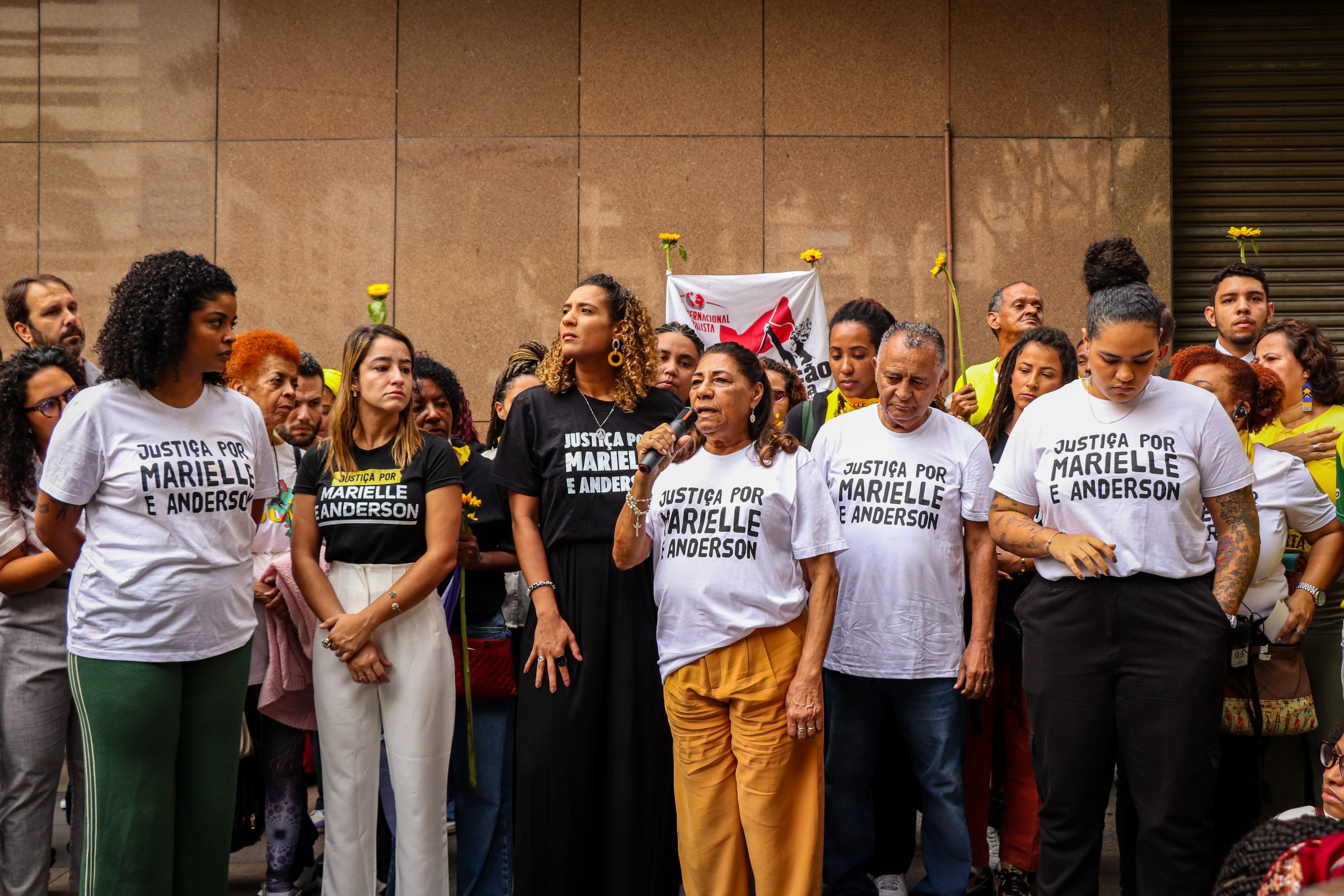
“Yesterday, we were asked how we’ve managed to come this far. When I got into the car, I remembered my mother saying it felt like we were arriving at the funeral all over again. It’s been almost seven years of deep pain, of an emptiness left by a woman who fought precisely against this and was murdered in such a brutal way. But we’ve always stayed strong, even in the face of challenges and adversity. I believe this has a lot to do with the upbringing we received from both my mother and my father.
Then, we were asked what Marielle’s most important legacy was, and I believe it’s this right here: the people who understand and have been fighting alongside us. We are a bit at a loss for words today. We’re deeply moved by everything because it feels like reliving all those moments again. We arrived at the crime scene and found Marielle the way we found her, then faced the moment of identifying Mari’s body at the coroner’s office, and after that came the emotional avalanche that followed—something we would not wish on anyone, or any family. If we look back and see all the people who are with us—the mothers, the daughters, the sisters, the wives, the partners—who also went through this and continue to do so, then today, the meaning of the word justice goes far beyond what will happen. We’ve been saying for some time that justice would be having them here with us. But sadly, we live in a society, in a country where justice is not the norm. From the impunity my father speaks of, to the lack of justice. How many women and men are waiting for a moment like this! We had to stay strong. Today is another step forward, and we hope it is a step that will serve as an example of strength, a step that marks the fact that it can’t be normal to murder a woman with five shots to the head. It’s not normal to wait seven years for justice. It’s not normal to keep witnessing people being shot in the head while they doze off on a bus. The violence that plagues this country is not normal. As long as we have the strength, we will keep fighting—not just for Mari, because her loss affects us in a deeply personal way, but also to confront the reality in which Black bodies are murdered, attacked, and slaughtered in every way possible, with no punishment. We have fought hard and will continue fighting for all those who come after us, for my daughters, for my granddaughters, and for all future generations, so that we can have a safer place.” — Anielle Franco
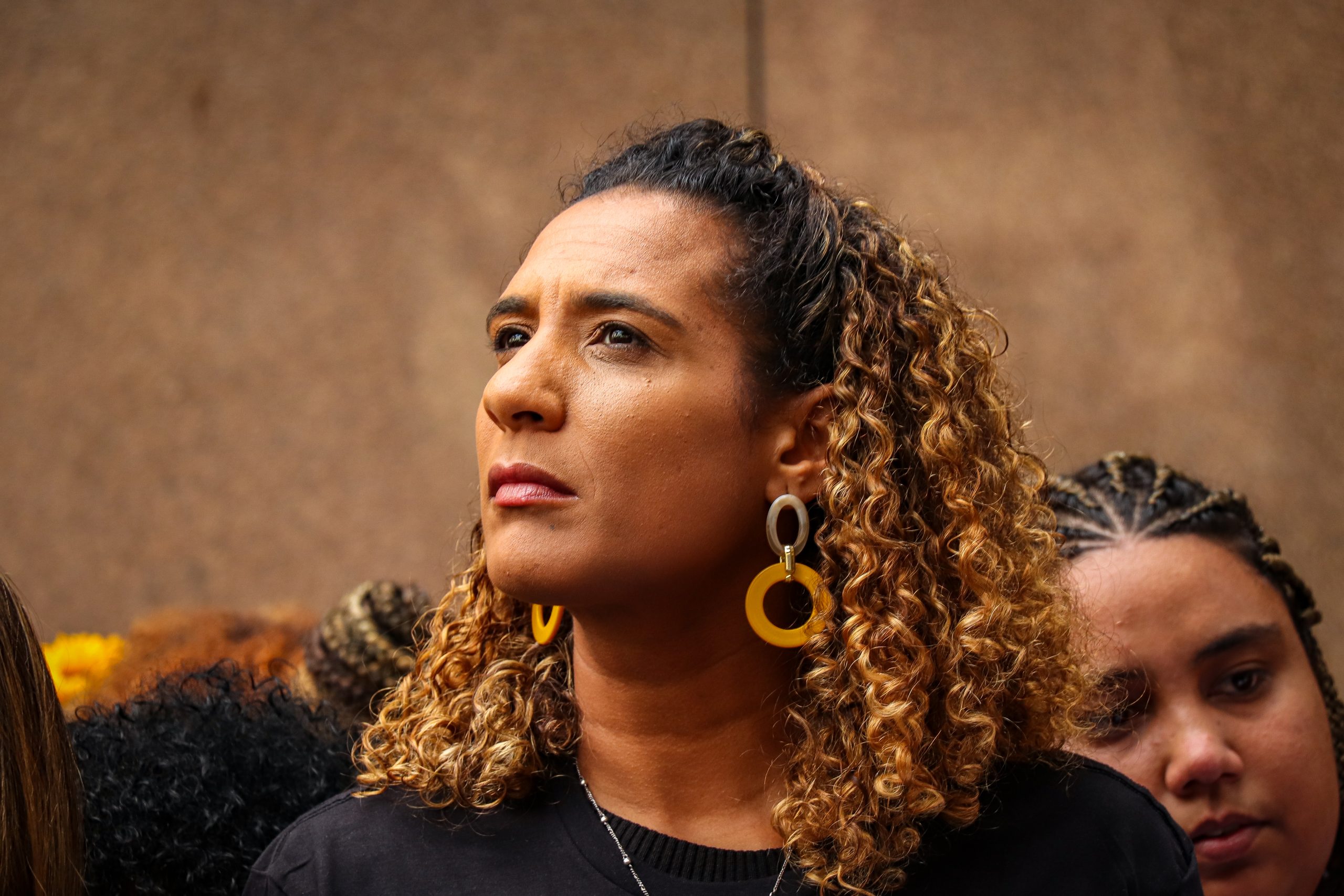
One of the most powerful voices at the press conference was Marinete da Silva, Marielle Franco’s mother.
“Today is a historic day for us, for me as a mother, for our family, and for all of you who stood by us through these six years and seven months. With your support, we are facing this jury with strength, determination, and faith, to make it clear how important it is for these men to be convicted today. After all this time, it feels like today is the real day they took my daughter from me. Seeing all of you here, that’s exactly how I feel—reliving that pain. But we’ll try to overcome it, even after all this time. It’s impossible not to get emotional, not to thank each one of you who has been with us through these years. We are here today for you, for all of you who never let go, who stood by us so we could be here together. We are forever grateful! We will be facing these men, who are confessed defendants, to say that this is not normal anywhere, in any democracy—to do what they did to my daughter and to other children, both before and after mine. We’ll be here today with you, joining forces. For this family, which has suffered so much all these years, it is crucial that these men are convicted and that death is not normalized; that lives like my daughter’s are not trivialized. I stand here today with other mothers, with others who feel the same pain. The support we’re receiving today means so much. We will continue to move forward, with all our strength and determination. They must be convicted. We need to send a message to Rio, to Brazil, and to the world.” — Marinete da Silva
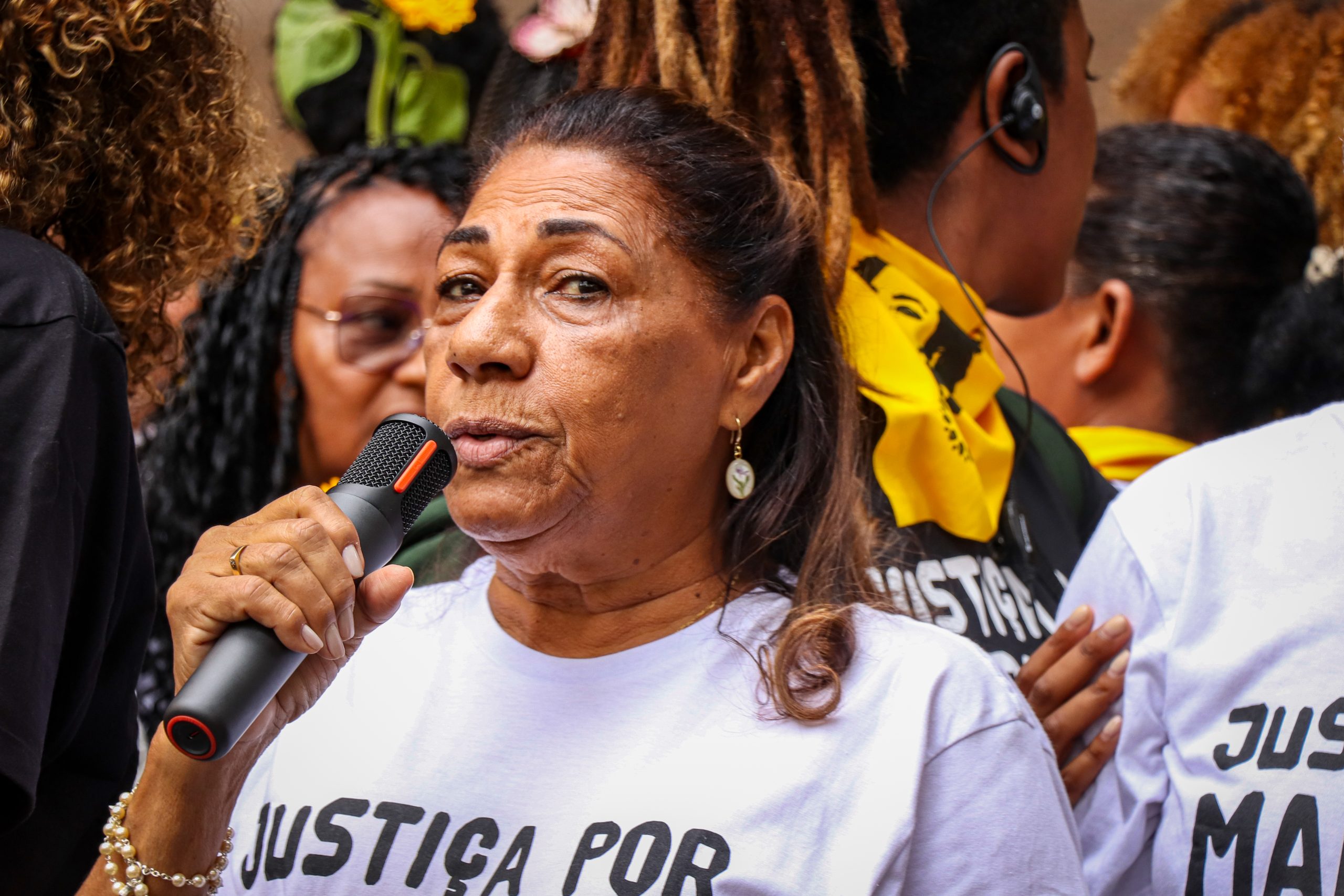
After the family entered the court, the rally continued with a march to the statue of Marielle Franco, located at Buraco do Lume, a traditional site for social demonstrations in the city. A public lecture about the case, addressing its context and social impact, was organized at Buraco do Lume on October 31.
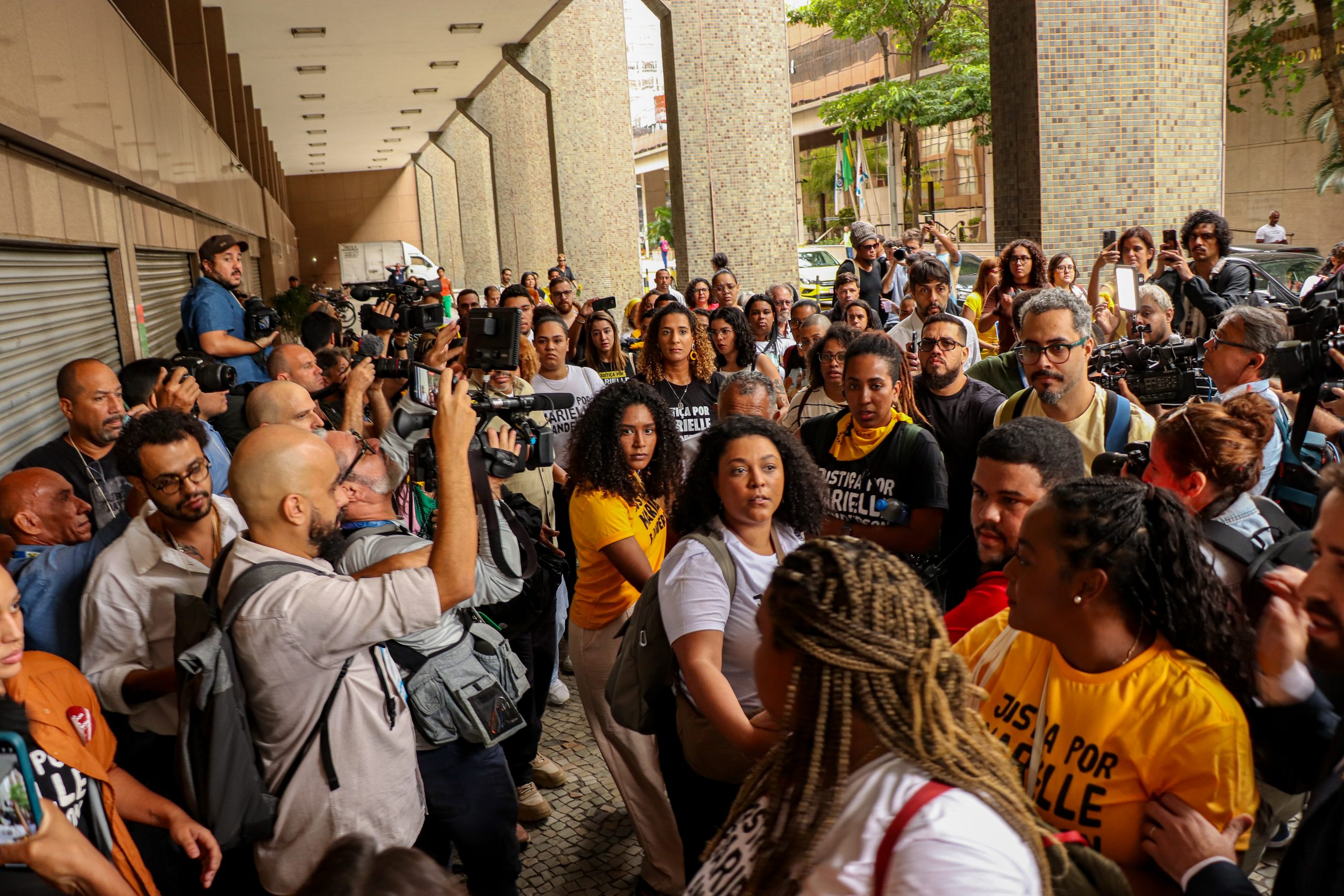
From the assassination to the trial, the investigations were often marked by controversy. Changes in police chiefs and judicial obstacles further reveal the power and level of involvement of militia members and political figures as masterminds behind the crime. The political feminicide of Marielle Franco underscores, above all, the infiltration of militia power into the State. Since the early years, public and international pressure has been intense—growing and solidifying through demonstrations and campaigns demanding justice and accountability for the assassins, accomplices, and masterminds.
“We have been saying that the omission of information by the then head of the Civil Police was perhaps one of the biggest surprises. I recall images of the chief of police with my parents, with Ágatha [Anderson Gomes’ wife], with everyone who said they were determined to solve the case. For us, it was a shock. We always understood the peculiarity and complexity of the case, but we also recognize the work done so far—despite interruptions, despite all the changes and shifts. Now, we understand who the people in there are… Politics, power, money, and the certainty of impunity. So, while we acknowledge that the investigations have progressed, we also know how difficult it was to get to where we are today. Each step forward is one more step toward the certainty of justice.” — Anielle Franco
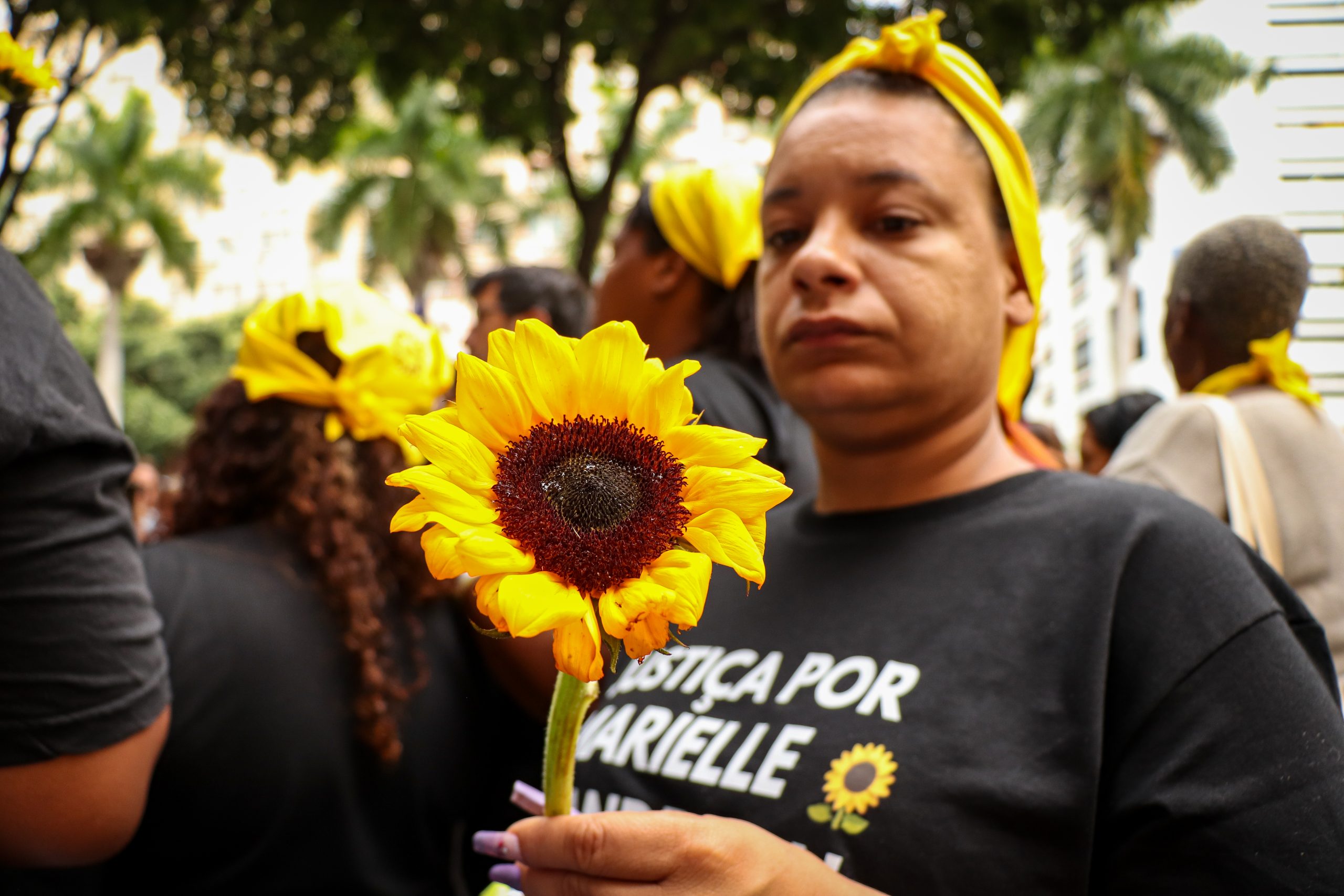
The confessed assassins of Councilwoman Marielle Franco and her driver Anderson Gomes, former military police officers Ronnie Lessa and Élcio Queiroz, are both linked to illegal activities, including involvement with militias. They were arrested following investigations that identified them by tracking the movements of the cloned car used in the crime.
In mid-2023, after years in prison, they entered into plea bargains to reduce their sentences. The accused, Ronnie Lessa and Élcio Queiroz, are facing charges for three crimes: double homicide with three aggravating circumstances (base motive, ambush, and means that impaired the victims’ ability to defend themselves), attempted homicide against Fernanda Chaves—Marielle’s advisor at the time and the sole survivor of the ambush—and the receipt of stolen property: the cloned silver Cobalt used in the crime.
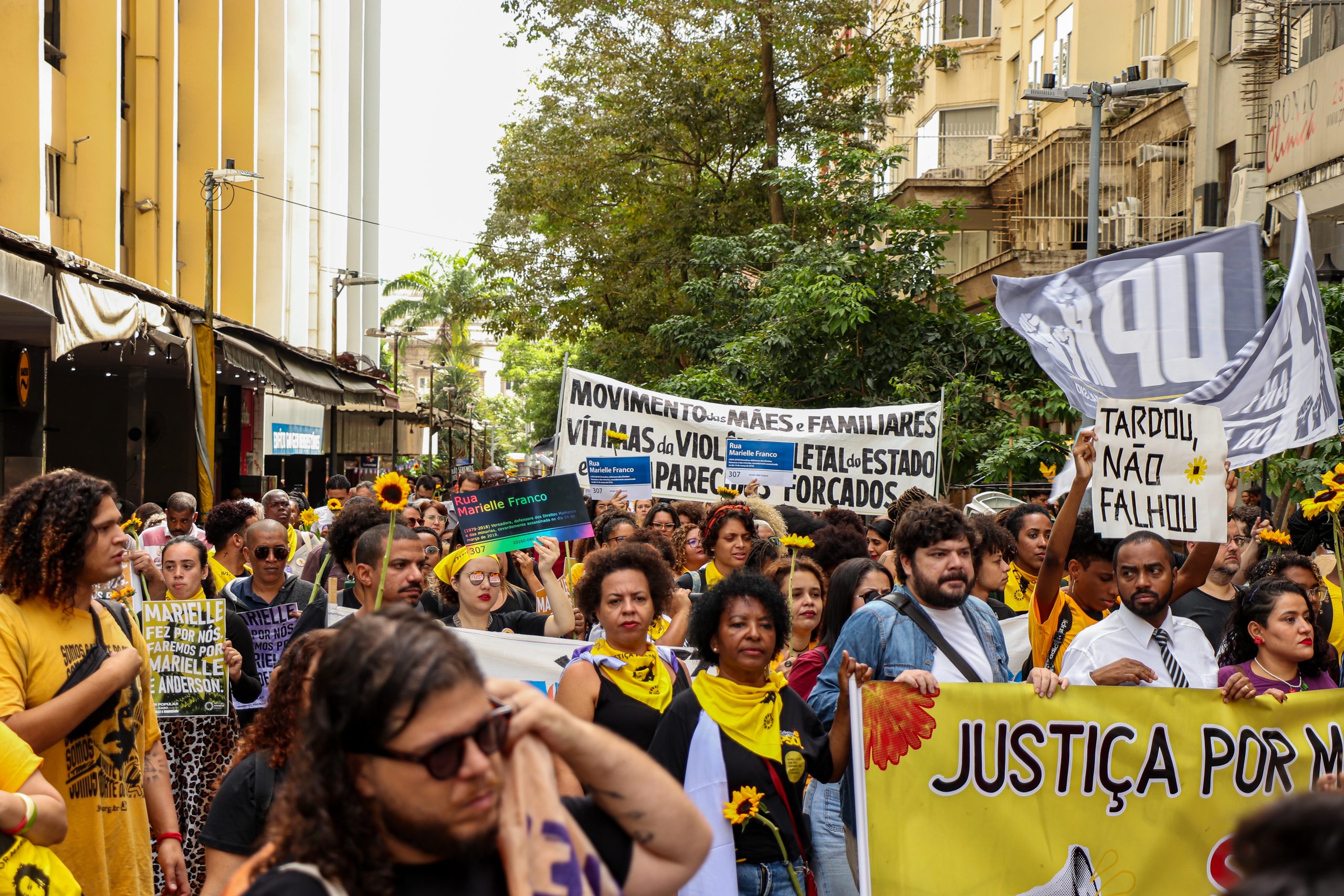
Claudia Alexandre, mother of three victims of lethal State violence—Cassio Felipe, 14, killed by a police officer at the entrance to his school; Alecsandro Alexandre, 15, killed just like his brother: by a police officer at the entrance to his school; and Matheus Bruno, shot three times in the back with a rifle by a police officer, while walking down the street—shared her expectations about the trial for the murder of Marielle Franco and Anderson Gomes.
“My expectation for today is that they be convicted. They’ve been well instructed; they’re militia members. The militia have spread their organization across all 92 municipalities in Rio de Janeiro. And these two are convicted murderers. Justice must be served, and may they stay in prison. Our unity strengthens us and keeps our belief in justice alive, even after the sluggishness of these six long years. This is what the State does—can you imagine? This terrible delay in delivering justice, this long and draining process to get to Court, has taken a toll on this family’s psychological and physical health, and the State doesn’t take any responsibility for it. It’s time to stop. It’s time for justice to prevail, even after six years. To all the families who are still waiting, who’ve been through this or are still going through it—don’t give up. Don’t be afraid, because fear kills you. It doesn’t empower you. When we’re fearless, they’re the ones who should worry. We are the ones leading. Seventy percent of those incarcerated are young Black people aged 18 to 29, and it’s the same with deaths. The State only knows how to kill, and when it doesn’t kill, it incarcerates. When it doesn’t incarcerate, it leaves us bleeding on the ground. This is extremely serious. The State must take responsibility and put an end to this immediately, because the pain is immeasurable, inestimable, and constant. This is not a pain of the flesh or the heart; it’s a pain that strikes directly at our souls and makes us ill. The State doesn’t pay for healthcare. It doesn’t take responsibility for funerals. For housing. For food. When it kills one of us, it kills an entire family. It leaves us all with permanent psychological damage, and it doesn’t care about these families. So fight. Fight tirelessly. Keep moving forward. Don’t stop.” — Cláudia Alexandre
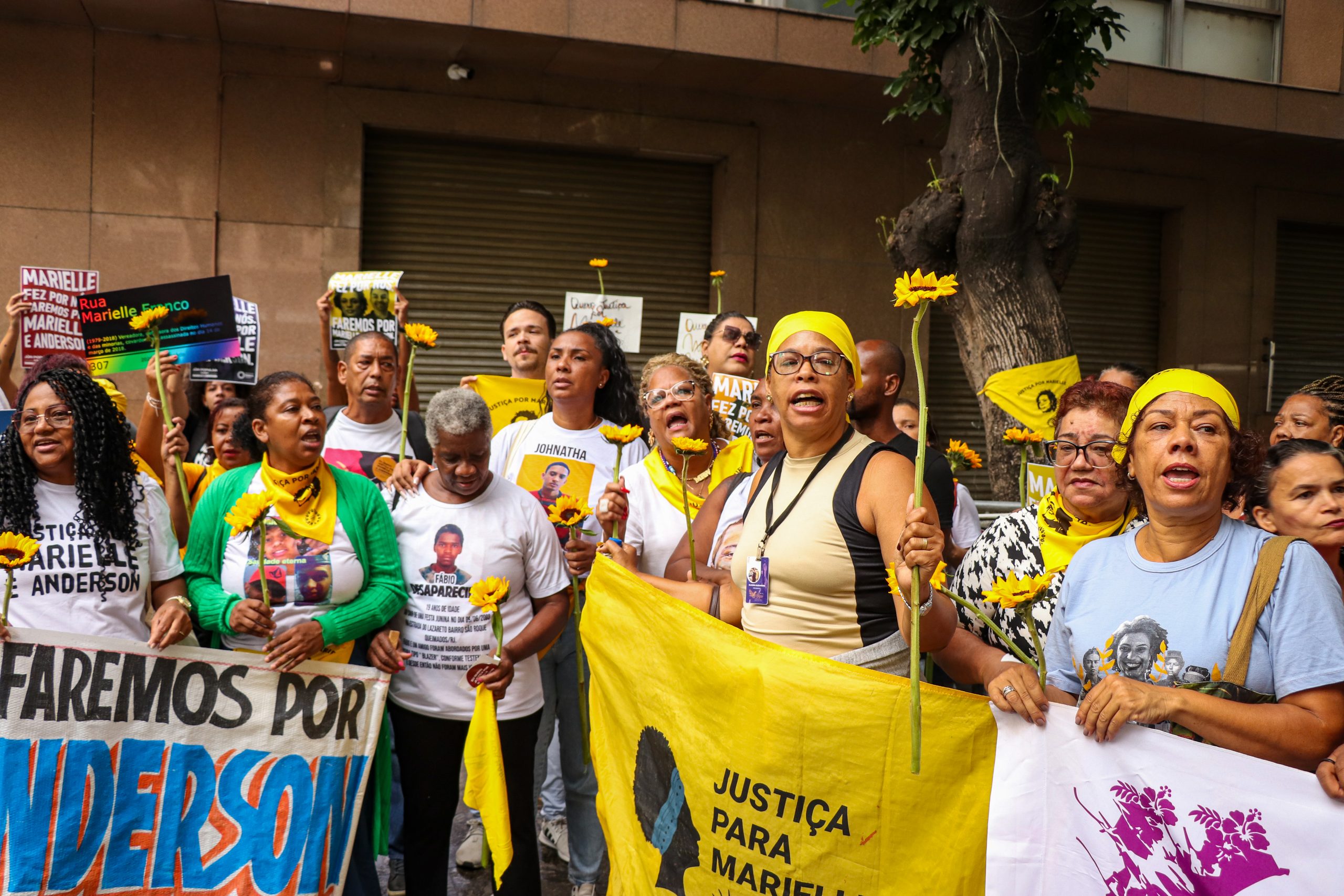
Lessa and Queiroz were heard via videoconference for over three hours, from the Tremembé Penitentiary in São Paulo and the Inclusion and Rehabilitation Center in Brasília, respectively. Nine witnesses were summoned—seven by the Public Prosecutor’s Office and two by the defendants’ defense. Testimonies were given by Fernanda Chaves, Marielle’s former advisor and a survivor of the attack; Marinete Silva, Marielle’s mother; Mônica Benício, Marielle’s widow; and Ágatha Arnaus, Anderson’s widow. Civil Police officer Carlos Alberto Paúra Júnior and Civil Police agent Luismar Corteletti testified for the prosecution. Criminal expert Carolina Rodrigues Linhares did not attend, but a video of her testimony was shown instead. Ronnie Lessa’s defense called Federal Police Chief Guilhermo Catramby as their first witness, while Federal Police Officer Marcelo Pasqualetti was the last to testify.
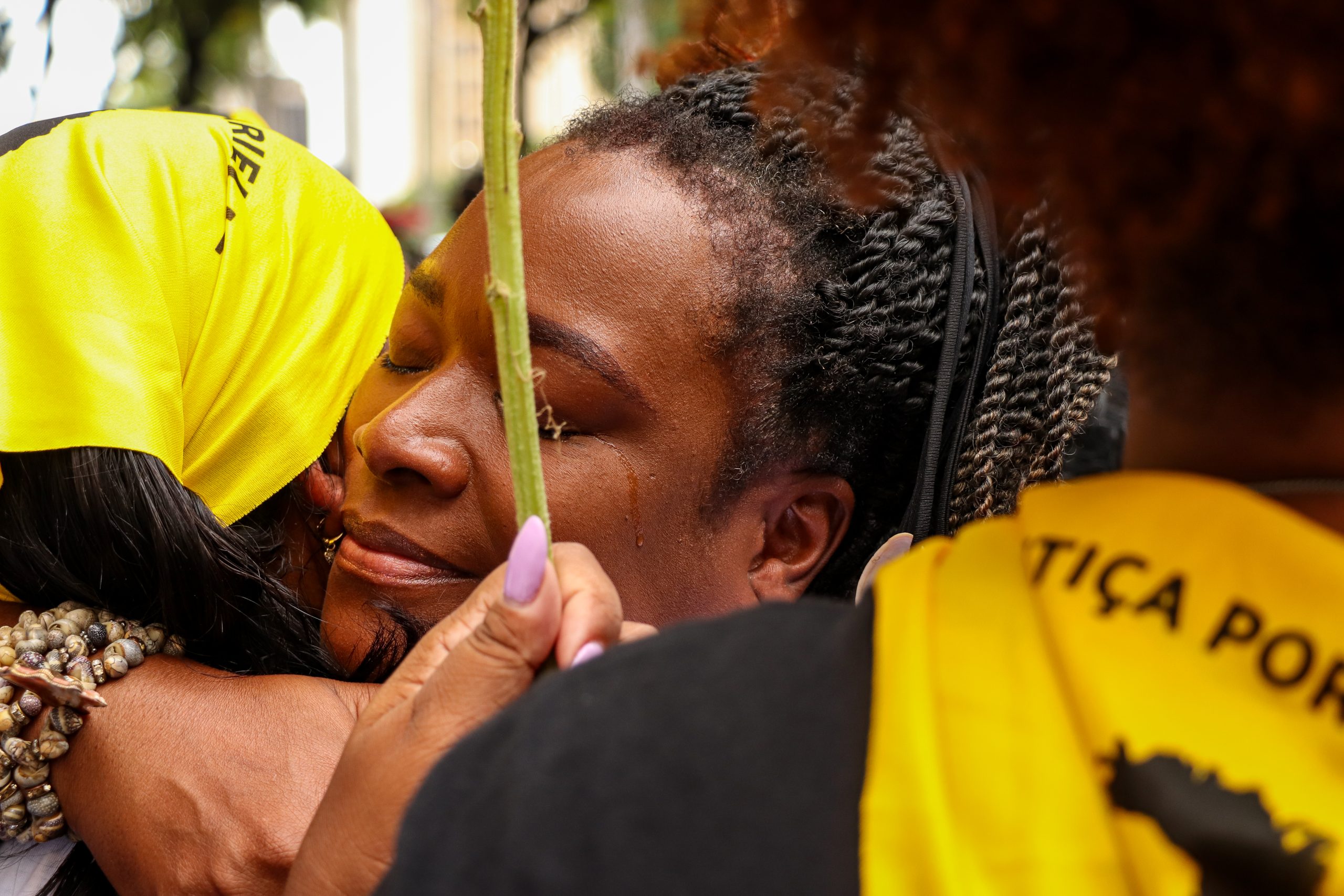
The people’s jury, composed of 21 members, including seven men selected on the day of the trial, found the defendants guilty. The sentence regarding the murders of Marielle Franco and Anderson Gomes emphasized that the accused, Ronnie Lessa, silenced the victim with gunshots to the head, demonstrating a complete lack of dignity and evidencing a death that was premeditated, commissioned, and desired. The defendant did not merely kill but meticulously planned every stage of the crime with cold calculation and precision. He carefully selected the weapon, ammunition, and sought a silencer to avoid cell phone tracking. He meticulously monitored the victim’s routine, chose the vehicle to be used, determined the location and time of the crime, and orchestrated the entire operation, including recruiting third parties to dismantle the car and dispose of the weapons. Every detail of the crime was premeditated and calculated to ensure an execution that left no traces.
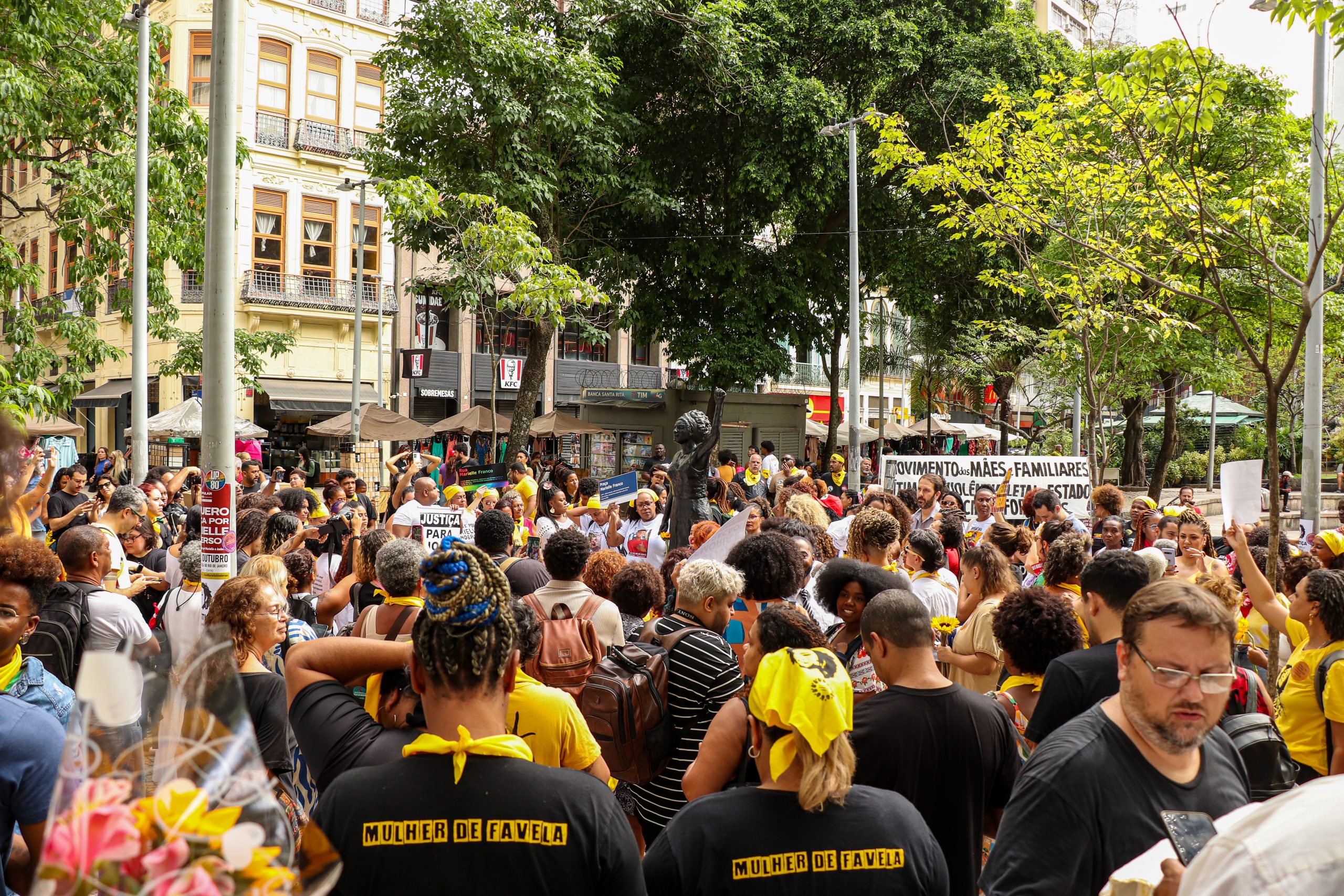
Even though they were sentenced to the maximum penalty, the plea bargain agreement significantly reduces their prison time: Élcio Queiroz’s sentence is limited to 12 years and Ronnie Lessa’s to 18 years in a closed regime, factoring in the 5 years and 7 months already served. Thus, the actual prison time they will serve does not seem to reflect the severity of their crimes. In total, the sentence imposed on Marielle Franco’s convicted murderers was:
- Pension: The accused were sentenced to pay financial support amounting to 2/3 of the victim’s salary (Anderson’s) until his children reach 24 years of age;
- Compensation for Moral Damages: The accused were sentenced to pay R$706,000 (approximately US$116,000) to each victim, including the survivor Fernanda, Marielle’s daughter (Luyara), Marielle’s partner (Mônica Benício), Anderson’s widow (Ágatha Arnaus), and Anderson’s underage son (Arthur).
- Court Costs: The accused were also sentenced to pay court costs, with potential exemption to be analyzed during the execution phase.
- Preventive Detention: The right to appeal while free was denied to the accused, and preventive detention was maintained due to the severity of the crime and the sentences imposed, which justify custody throughout the process:
- Ronnie Lessa: 78 years, 9 months, and 30 days in total sentences;
- Élcio Queiroz: 59 years, 8 months, and 10 days.
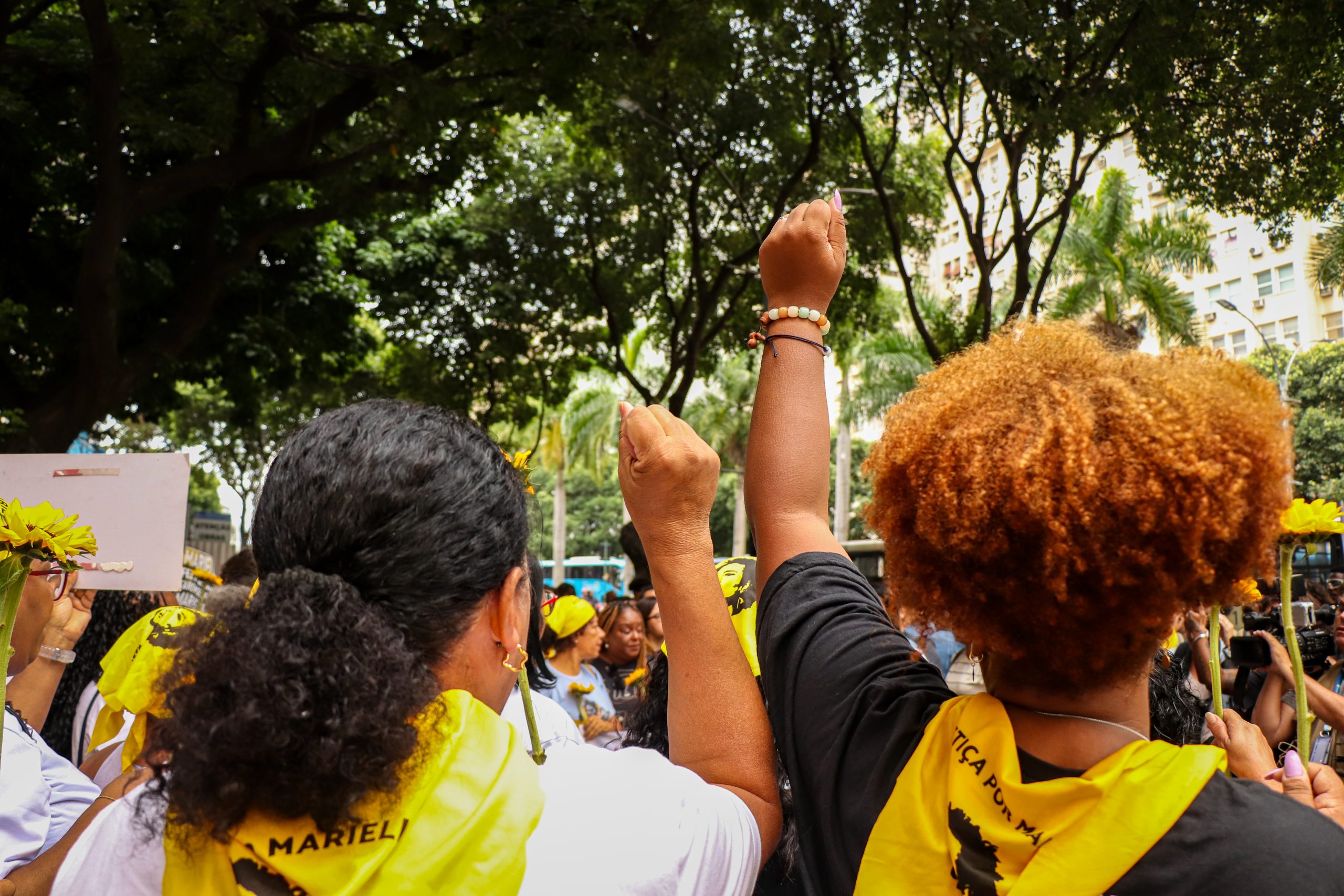
During the rally, Jorge Roberto Lima da Penha, whose son, Roberto de Silva de Souza, was executed in 2015 with over 111 shots while celebrating his first job alongside three other youths, who were also shot, expressed his views on the concept of justice and the sentences upheld by the judicial system.
“Today, we are here fighting, seeking reparations because we have been waiting for Marielle’s trial for six years, and today is a significant day. Delayed justice is not justice! This is reparations, and we want an answer from the State—to all the families and to society—so this does not go unpunished. For many families, the trial never even reaches this stage. There are families whose police inquiries don’t even make it out of the police station. This is what we want. I hope the State provides a satisfactory response to both the families and society. That there is a conviction for those who executed Marielle and Anderson together. To all family members, I say: we cannot be silenced. We must take to the streets, rallying all the time, because we are the voice of our children. We cannot stop; we must always fight!” — Jorge Roberto Lima da Penha
